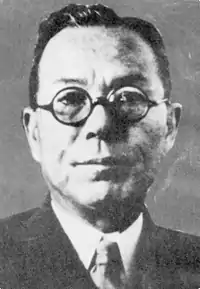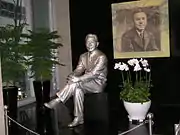Kim Seong-Su
Kim Seong-Su (Korean: 김성수; Hanja 金性洙, October 11, 1881-February 18, 1955), the second vice-president of the Republic of Korea (대한민국; 大韓民國), was a politician, educationist, journalist, and founder of Kyung-Sung textile Co. (경성방직회사; 京城紡織會社) , the Dong-A Ilbo(동아일보; 東亞日報), and Korea University(고려대학교; 高麗大學校). After he died he was given the Order of Merit for National Foundation(건국훈장; 建國勳章). He is also known by his pen name Inchon (인촌; 仁村)

Life
Early life
Kim Seong-Su was born on October 11 1891, in Gochang(고창; 高昌), Jeollabuk-do(전라북도; 全羅北道), South Korea. He graduated from Waseda University in Japan in 1914, majoring in Political Science and Economics. After returning home, he took over Jung-Ang High School, which was in financial difficulties, and took office as the president in 1917. Also, he founded Kyung-Sung textile Co. in 1919 in order to realize Korea’s economic independence from Japan and to foster its national capital. He launched the Dong-A Ilbo in 1920 and took charge of Boseong College (보성전문학교; 普成專門學校), the predecessor of the present Korea University.
Pro-Japanese
In 1938, he was a promoter of the Federation for National Mobilization of Korean(국민정신총동원조선연맹; 國民精神總動員朝鮮聯盟), which was one of the pro-Japanese groups. He also took part in several pro-Japanese activities, writing articles which admired student soldiers and the draft system for Japan. Due to these activities, he was included in the list of 3,090 pro-Japanese collaborators released by the Institute for Research in Collaborationist Activities(민족문제연구소; 民族問題硏究所) in 2008.
After Korean Liberation

After the Independence from the Japan Occupation on August 15 1945, in 1946 he became the governor of Korea Democratic Party(한국민주당; 韓國民主黨) and the ninth president of the Dong-A Ilbo. He was opposed to U.S. trusteeship of Sourh Korea and in 1949 he took office as the supreme council of Democratic National Party(민주국민당; 民主國民黨). He was inaugurated as the second vice president of South Korea in 1951, but resigned the following year because he was against the dictatorial powers of President Rhee Syng-man(이승만; 李承晩). The same year he became an adviser of Democratic National Party and then, continued to take part in the nongovernment party. He was posthumously awarded the Republic of Korea Medal of Order of Merit for National Foundation in 1962.
Related pages
- Dong-A Ilbo
- Korea University
- Song Jin-woo
- Jungang high School
- Korean Democratic Party
- Rhee Syng-man
- Kim Gu
- Kim Kyusik
- Shin Ik-hye
- Chang Myon
- Yun Chi-Young
- Yun Chi-Ho
- Yun Posun
Other websites
| Preceded by Rhee See-Young |
2nd VicePresidents of South Korea 1951 - 1952 |
Succeeded by Ham Tae-Young |